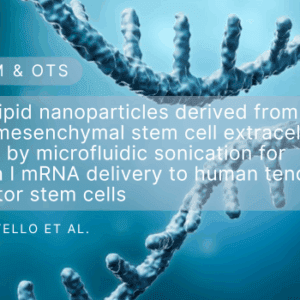Authors
Rubén Pareja Tello, Erwin Pavel Lamparelli, Maria Camilla Ciardulli, Jouni Hirvonen, Goncalo Barreto, Nicola Mafulli, Giovanna Della Porta, Hélder A. Santos
Keywords
OTS mRNA, custom mRNA
DOI
https://doi.org/10.1039/D4BM01405G
Journal: Royal society of chemistry, biomaterials science
PMID: 40033856
Abstract
Tendon degeneration remains an intricate pathological process characterized by the coexistence of multiple dysregulated homeostasis processes, including the increase in collagen III production in comparison with collagen I. Mesenchymal stem cell-derived extracellular vesicles (MSC-EVs) remain a promising therapeutic tool thanks to their pro-regenerative properties and applicability as drug delivery systems, despite their drug loading limitations. Herein, we developed MSC-EV-derived hybrid lipid nanoparticles (MSC-Hyb NPs) using a microfluidic-sonication technique as an alternative platform for the delivery of collagen type I (COL 1A1) mRNA into pathological TSPCs. The MSC-Hyb NPs produced had LNP-like physicochemical characteristics and were 178.6 nm in size with a PDI value of 0.245. Moreover, MSC-Hyb NPs encapsulated mRNA and included EV-derived surface proteins such as CD63, CD81 and CD144. MSC-Hyb NPs remained highly biocompatible with TSPCs and proved to be functional mRNA delivery agents with certain limitations in comparison with lipid nanoparticles (LNPs). In vitro efficacy studies on TSPCs showed a 2-fold increase in procollagen type I carboxy-terminal peptide production comparable with the effect caused by LNPs. Therefore, our work provides an alternative production method for MSC-EV-derived hybrid NPs and supports their potential use as drug delivery systems for tendon regeneration.



